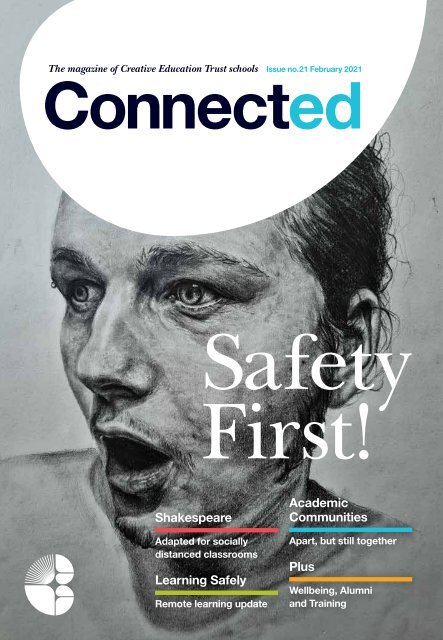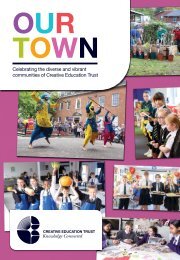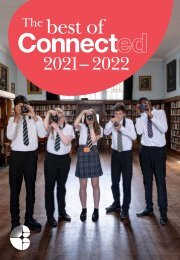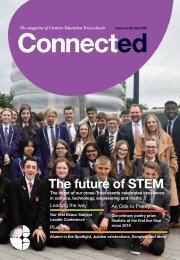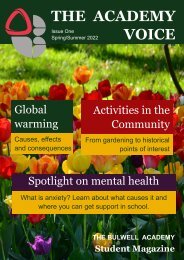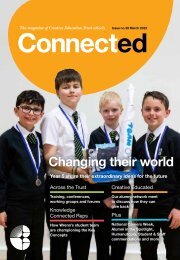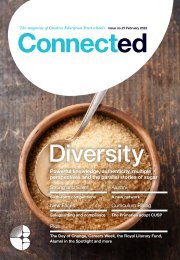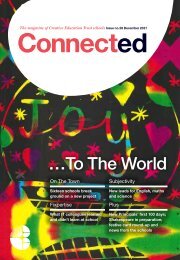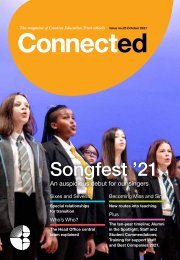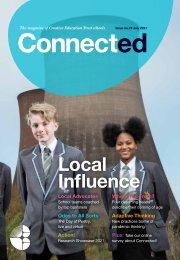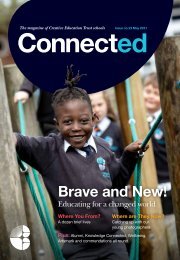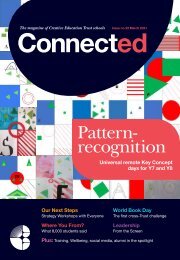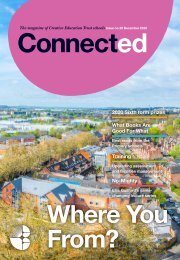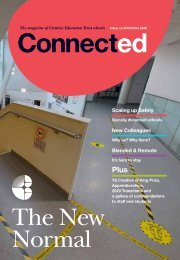Connected issue 21
The 21st issue of Connected: the magazine of Creative Education Trust schools
The 21st issue of Connected: the magazine of Creative Education Trust schools
Create successful ePaper yourself
Turn your PDF publications into a flip-book with our unique Google optimized e-Paper software.
The magazine of Creative Education Trust schools Issue no.<strong>21</strong> February 20<strong>21</strong><br />
<strong>Connected</strong><br />
Safety<br />
First!<br />
Shakespeare<br />
Adapted for socially<br />
distanced classrooms<br />
Learning Safely<br />
Remote learning update<br />
Academic<br />
Communities<br />
Apart, but still together<br />
Plus<br />
Wellbeing, Alumni<br />
and Training
<strong>Connected</strong><br />
02<br />
The magazine of Creative Education Trust schools<br />
Where<br />
You<br />
From?<br />
Inspirational Iris leads the way for Bulwell<br />
“It’s nice to be recognised,<br />
but the main reason is to<br />
help the people who most<br />
need it in the community<br />
where I live.”<br />
Iris Wallace and her family moved to Bulwell<br />
only a year ago, but she’s taken the place to<br />
her heart. When lockdown came, communityminded<br />
Iris wondered what she could do to<br />
help those in need around her. Now she has<br />
been named one of The Nottingham Building<br />
Society’s Innovative Young People of 2020.<br />
Bulwell Forest Garden is a community food growing<br />
project with a regular timetable of events and<br />
workshops for local residents. It aims to support the<br />
health and wellbeing of people of all ages through<br />
education, environmental play and, of course, plenty<br />
of organically grown fruit and vegetables. Iris, who<br />
is 11, spends several hours a week at the garden,<br />
undertaking disparate tasks from fundraising to<br />
litter-picking and making bird feeders, alongside<br />
tending to the plots and the community orchard.<br />
Iris also volunteers at Bestwood and Bulwell Food<br />
Bank putting together vital food parcels. Just before<br />
Christmas she supported her mums Kelly and Shelly<br />
in cooking more than 250 hot meals for families in<br />
need over a two-week period.<br />
Set up as a mutual society in 1849 by a Quaker<br />
businessman, school founder and abolitionist named<br />
John Fox, The Nottingham is a prominent local<br />
building society. It established the Young People’s<br />
award to shine a light on young people who have<br />
found inspiring ways to further their education or<br />
boost their career aspirations. One of Iris’ fellow<br />
community gardeners, Adele Brooksbank – also a<br />
trustee of the food bank - saw an opportunity to<br />
reward Iris’ outstanding commitment to vulnerable<br />
community members. Ms Brooksbank said she<br />
nominated Iris “not just because she has helped us<br />
in the garden, but because she has overcome<br />
her own shyness and continues to look for new ways<br />
of learning and gathering information.” As it turned<br />
out, 19 other people from in and around Bulwell<br />
also nominated Iris for her extraordinary efforts!<br />
Issue no.<strong>21</strong><br />
February 20<strong>21</strong><br />
Where You From?<br />
Extra!<br />
03<br />
Creative Education Trust pupils go to school across<br />
England in areas that are unique, historical, modern<br />
and different in ways that only the people who live<br />
there can know about.<br />
They might live by the sea, in a town or in a city.<br />
They and their parents come from all over the world<br />
and they may have lived in more than one place.<br />
In order to develop new cross-Trust creative projects<br />
that celebrate these unique communities and places<br />
of belonging, the Programmes team <strong>issue</strong>d a survey<br />
to establish a baseline of perceptions among<br />
secondary school pupils about where they’re from<br />
and how they feel about it.<br />
As the survey closes, <strong>Connected</strong> can report that<br />
although 78% of respondents tend to agree that<br />
where they come from gives them advantages, and<br />
60% feel more positive about where they come from<br />
than they did before Covid-19, the overwhelming<br />
majority – almost eighty percent – don’t think it<br />
actually matters where you’re from. We hope this<br />
is because they have such confidence that their<br />
education will serve them well!<br />
“I am more positive about the place I live<br />
now than I was before the Covid pandemic.”<br />
Agree<br />
27%<br />
Somewhat<br />
agree<br />
33%<br />
Disagree<br />
20%<br />
Somewhat<br />
disagree<br />
20%<br />
Iris won the 11-13 years category and took home<br />
a £250 tech voucher prize. Her dedication to<br />
helping those in need remains unclouded by this<br />
public recognition: “It is nice to be recognised in<br />
this way but the main reason I continue to do as<br />
much volunteering as I can in my spare time is to<br />
help people who most need it in the community<br />
where I live.”<br />
Creative Education Trust joins Michelle Strong,<br />
Principal of Bulwell, and all of Iris’ schoolmates<br />
in congratulating her on the award.
04<br />
<strong>Connected</strong><br />
The magazine of Creative Education Trust schools<br />
Academic Communities<br />
Issue no.<strong>21</strong><br />
February 20<strong>21</strong><br />
05<br />
The introduction of Academic Communities arises<br />
from Creative Education Trust’s strategic goal of<br />
securing direct and positive impact on our children<br />
by developing people and their talents. This goal<br />
is reflected in both the Education and the Human<br />
Resources Action Plans, and is an enactment of<br />
the observation articulated by Professor William<br />
Richardson, Chair of the Education Standards<br />
Committee, in his 2019 discussion paper, Academy<br />
Schools in England’s Deprived and ‘Left Behind’<br />
Communities:<br />
“Although often taken for granted and consequently<br />
neglected, schooling is fundamentally a process of<br />
relationships and thus highly people intensive. Because<br />
the crucial people dynamic within a school is that of<br />
relationships between adults in authority and children<br />
under tutelage, the calibre of a school’s staff goes<br />
most of the way to determining the calibre of the<br />
school as this is experienced by each child.”<br />
Harvard professor Linda Hill, co-author of Collective<br />
Genius, has studied some of the world's most creative<br />
environments for approaches to keeping great ideas<br />
flowing, from everyone in an organisation: “Working<br />
closely together is one way to unlock our creativity and<br />
give every great idea a chance.” As a Trust, we have<br />
used the past 6 months to turn ambitions like these into<br />
reality. By Christmas of 2020, our existing collaborative<br />
networking groups have been formalised, and a number<br />
of others have been created with a view to supporting<br />
colleagues with structured and regular opportunities<br />
to enhance their curriculum offers, share challenges,<br />
creatively design solutions, moderate and standardise.<br />
“In this <strong>issue</strong>, we can<br />
update readers that twenty<br />
Academic Communities<br />
are now up-and-running.”<br />
We’ve written before about these aspirations and, in<br />
this <strong>issue</strong>, we can update readers that twenty Academic<br />
Communities are now up-and-running, each with a specialist<br />
Chairperson and a newly-designed electronic platform:<br />
from secondary and post-16 subject specialisms, to CEIAG,<br />
PSHCE, SEND and Initial Teacher Training. While the activity<br />
and impact of these groups is overseen by Gwayne Webb as<br />
Director of Learning and Teaching, they are further supported<br />
by Wrenn Vice Principal Nimish Lad in his leadership capacity<br />
on curriculum development and research. Our newlyappointed<br />
School Improvement Coordinator will support the<br />
administrative requirements of these collaborative interactions.<br />
The inaugural meetings held in December and January<br />
revealed real appetite for closer-working opportunities of this<br />
kind. Teams are devising agenda items that will accelerate<br />
the pace of their planning and increase the rate at which<br />
their efforts directly and positively impact on the educational<br />
experiences of our students – and their outcomes. <strong>Connected</strong><br />
caught up with some of the specialists who are chairing<br />
Communities, who had this to say:<br />
When Marc Jordan first<br />
addressed the staff<br />
of Weavers in 2013,<br />
my thoughts were<br />
immediately drawn to<br />
the possibilities of our<br />
collected expertise<br />
and contacts. We’ve<br />
navigated the present<br />
challenges as teams<br />
with a military precision<br />
and shown that when<br />
we work collaboratively<br />
anything is possible:<br />
blended learning and<br />
virtual live lessons,<br />
secure IT provision<br />
released to thousands of young people, critical<br />
support for our vulnerable students, the administration<br />
of lateral flow testing, devising and reviewing risk<br />
assessment after risk assessment. Years of work within<br />
the Trust have brought<br />
us to this point and I’m<br />
the proud Chair of the<br />
Academic Community<br />
for Post-16 Provision.<br />
The platform to really<br />
achieve something<br />
exciting for thousands<br />
of young people<br />
is now established.<br />
Magnus Wallace,<br />
Weavers<br />
The Mentoring<br />
Community I<br />
chair will support<br />
mentors to<br />
provide a positive<br />
induction into<br />
their trainee<br />
teachers’ chosen<br />
career, building<br />
their resilience<br />
from the start.<br />
Collaboration feels<br />
more powerful<br />
than ever now<br />
that we’re so isolated in our teaching and our schools.<br />
Each of us is in the same role with the same priorities,<br />
but the Community is one step removed from the<br />
inner workings of our schools. It gives us an important<br />
opportunity to think critically about our professional<br />
practice, and to think beyond the immediate<br />
pragmatics about how to apply the Creative Education<br />
Trust vision in our own settings.<br />
Georgina Spencer, Wrenn<br />
In the current pandemic, it is even more important that we share innovative ideas<br />
for growing our students into well-rounded young thinkers through our teaching.<br />
The Academic Community for maths is building enthusiasm and a passion for<br />
mathematics across the Trust, enabling students to enjoy the subject so that they<br />
become confident mathematicians.<br />
Jodie Green, Hart School<br />
Working alongside an inspirational group of<br />
science leaders has been amazing and I was<br />
thrilled to be offered the Chair of our Academic<br />
Community. I envisage it as a centralised<br />
catalyst for relationships as result of different<br />
needs and interests, and as a showcase for<br />
developments. It’s a superb platform for all the<br />
schools in the Trust to have a voice, to face<br />
challenges together and have greater impact<br />
on the progress of our students.<br />
Sarah Golley, Wrenn<br />
I want to share my vision for the future as Chair of the<br />
English Academic Community. Now more than ever,<br />
we need to utilise the relationships we’ve formed to<br />
guarantee the same level of teaching and learning<br />
for students across our Trust. The Community will<br />
support teachers with resources and materials and<br />
will ensure the assessments and data are robust,<br />
fair, and trustworthy through careful monitoring and<br />
moderation. Additionally, we’ll keep an eye on training<br />
and recent research from external bodies on behalf of<br />
all the schools as we align and embed the new English<br />
curriculum.<br />
Heidi Crawley, Wrenn<br />
There’s more to come! Over the course of this new<br />
Spring term, the Education Team has been working<br />
closely with leaders across the schools to add<br />
Communities, not only for the remaining subjects but<br />
also for complex but crucial areas of focus such as<br />
behaviour, learning and teaching,<br />
attendance and pupil premium.<br />
The ambition is to create an<br />
additional ten Communities by<br />
Easter. The editorial team will<br />
make sure we keep readers<br />
abreast of the impact of this<br />
important initiative for the Creative<br />
Education workforce.
06<br />
<strong>Connected</strong><br />
The magazine of Creative Education Trust schools<br />
Sitting Safely<br />
Now that the progress of Covid-19 has locked<br />
many colleagues down again as home-workers,<br />
the HR team would like to remind everyone<br />
of the importance of a healthy workstation.<br />
Creative Education Trust’s guidance and risk<br />
assessment for homeworking is available here,<br />
and this is the list of ingredients for a healthy<br />
set-up to work from home:<br />
• A suitable table or desk<br />
• A suitable chair with a well supported back<br />
• A desk set-up that reduces the need to twist,<br />
turn and lean<br />
• Adequate lighting<br />
• Suitable temperature<br />
and humidity levels<br />
• A separate mouse,<br />
keyboard and screen<br />
NEW!<br />
Rental<br />
Deposit Loan<br />
Scheme<br />
We’re pleased to announce<br />
the introduction of a new<br />
benefit to assist staff in rented<br />
accommodation. We know how<br />
difficult it can be to find the<br />
deposit for your first rental, or to<br />
move from an existing property<br />
when the landlord will not return the<br />
deposit until after you leave.<br />
This new policy is designed to help.<br />
It enables you to have a salary advance for<br />
the deposit and repay the loan over an agreed period.<br />
Certain criteria that need to be met are contained in the<br />
full policy, available here:<br />
cetcloud.org.uk/policies<br />
Safe<br />
Screens<br />
Issue no.<strong>21</strong><br />
February 20<strong>21</strong><br />
In addition, advice is available here on minimising the risk of<br />
strain from the prolonged use of Display Screen Equipment<br />
• Taking frequent short breaks<br />
• Changing your posture as frequently as possible<br />
• Assuming a more comfortable position<br />
• Adjusting your keyboard to get<br />
a good keying in position<br />
• Positioning your mouse within<br />
easy reach<br />
• Adjusting the brightness and<br />
contrast on your screen<br />
HEALTH<br />
WARNING<br />
Please note that although<br />
all the illustrations are<br />
authentic, not all of them<br />
are exemplary!<br />
NEW!<br />
The Creative<br />
Education Trust<br />
Staff Handbook<br />
here<br />
In the current climate, many external, ‘feel-good’<br />
solutions we depend on aren’t easy to come by.<br />
Dena Smart, Director of HR, dusts off her old<br />
Neurolinguistic Programming course to share<br />
some cheering principles with Creative Education<br />
Trust colleagues.<br />
Ever heard of Neuro Linguistic Programming? Most people<br />
will answer ‘no’, but might be surprised to find that they’ve<br />
learned a lot of NLP things in coaching, personal<br />
development and even weight loss programmes.<br />
Developed in the 1970s by Richard Bandler and John Grinder<br />
in the USA, NLP is a theory of communication that brings<br />
together neurological processes, language and behavioural<br />
patterns. Its effectiveness has mixed scientific reviews –<br />
Wikipedia classifies it at ‘pseudoscientific’ – but having<br />
studied it in the 1990s, I definitely think it has something<br />
to offer us now.<br />
My back story is that I am an only child from a low-income<br />
family and my father was a fairly volatile alcoholic. This<br />
meant that as a child I became watchful of human behaviour<br />
and proficient in ‘reading the mood’. No surprise that my<br />
first degree was psychology. NLP interested me because it<br />
brought together brain and behaviour and, while some of the<br />
things I was taught were borderline cultish, other ideas were<br />
really helpful and I’ve come across them packaged<br />
in many different ways and fields since.<br />
My 30-year old daughter recently told me she’d started<br />
‘manifesting’. Apparently this is very current – Vogue.co.uk<br />
defines manifestation as “the materialisation of a thought or<br />
belief into physical form, based on the idea that our mind is a<br />
powerful tool for creation”. I brushed off my old NLP manual<br />
and, together, we found many similarities. You might recognise<br />
some of these, and with practice and thought they can really<br />
make a difference to how you feel:<br />
01<br />
02<br />
Positive outcomes<br />
Don’t focus on what you don’t want; instead,<br />
really try to imagine what you do want.<br />
Be aware of beliefs that<br />
limit you<br />
‘I could never….’, for example – and question whether<br />
they’re true.<br />
03<br />
It’s easier to change the map<br />
than to change the outside<br />
world<br />
We create maps, or diagrammatic representations, of reality<br />
from our sensory experiences, then operate and communicate<br />
from the maps we have created. Everyone’s map is different,<br />
and many human problems are caused by the maps in our<br />
heads, but you can change the map.<br />
04<br />
If you keep<br />
doing what<br />
you’ve always done,<br />
you’ll keep getting<br />
what you've<br />
always got<br />
If what you're doing isn't<br />
working, do anything else! It is<br />
easier to change your own behaviour than other people's.<br />
05<br />
Every experience is an<br />
unprecedented opportunity<br />
to learn<br />
There is no failure, only feedback; no mistakes, only results;<br />
no errors, only learning.<br />
06<br />
The person with the greatest<br />
flexibility of thought and<br />
behaviour can control the outcome<br />
of any interaction<br />
Excellence comes from having many choices; and<br />
wisdom from multiple perspectives.<br />
07<br />
It is not what happens to you<br />
that makes the difference;<br />
it's what you do with what happens<br />
to you.<br />
08<br />
You cannot not<br />
communicate<br />
Even if you say nothing, 93% of<br />
communication is nonverbal; so be<br />
conscious of your impact.<br />
09<br />
There’s a positive<br />
intention behind<br />
all human behaviour<br />
Identify the positive intention behind<br />
each of your interactions with others,<br />
and be aware that the way you behave<br />
may not represent your positive intention<br />
successfully.<br />
Many avenues of support for positive<br />
mental health are available online and<br />
through the webinars on the Health<br />
Assured EAP portal (username;<br />
creative password: education) to<br />
which all Creative Education Trust<br />
employees have access.<br />
Dena recommnends The Art of Possibility<br />
by Rosamund Stone Zander and<br />
Benjamin Zander for a real shift<br />
in thinking.<br />
Wellbeing
<strong>Connected</strong><br />
08<br />
Safe<br />
The magazine of Creative Education Trust schools<br />
Creative Education Trust’s annual<br />
Shakespeare project moves online<br />
Shakespeare<br />
The annual Days of Shakespeare have become<br />
treasured in the Trust calendar since their launch in 2014.<br />
But with last year’s challenges, and more anticipated this<br />
year, the Programmes team were cautious about proposing<br />
Shakespeare 2020. We discovered that you cannot stop<br />
our teachers’ or students’ appetites for performance!<br />
Schools were <strong>issue</strong>d with guidelines, masterminded by our<br />
partners HMDT Music, for a project modified for classroom<br />
(rather than stage) and remote delivery, and a set of brandnew<br />
resources to work with. The result? An astonishing 375<br />
students participating across seven secondary schools:<br />
performing dramatic scenes, writing their own drama and<br />
making artwork inspired by the Bard.<br />
Experts online<br />
In previous years, students have had a wonderful encounter<br />
with two visiting professionals: a voice coach, and a theatre<br />
designer. This year students and their teachers have had<br />
a choice of nine virtual masterclasses from five creative<br />
professionals.<br />
Theatre Director Katie Lewis, who learned her skills<br />
at the Royal Shakespeare Company, presented films<br />
on five core rehearsal skills: exploring Shakespeare’s<br />
language; performing verse; ‘actioning’ feelings or ideas;<br />
characterisation; and improvisation. To expand the creative<br />
ways for students to engage with Shakespeare’s texts,<br />
four additional films were <strong>issue</strong>d: designing for the theatre;<br />
illustration; photography; and typography for film. In each,<br />
a creative professional gives an insight into their career and<br />
working processes, and set activities for the students to try<br />
Above: Two of the video masterclasses: Theatre Director Katie Lewis<br />
reveals the secret of verse; and a crash course in experimenting with<br />
typography from graphic designer and illustrator Seonaid Mackay.<br />
out for themselves. Students submitted their artwork along<br />
with their original scipts and filmed performances, to share<br />
with other schools.<br />
Laura Marriott, Head of Drama at Weavers, said her students<br />
were “brilliant participating in the online activities and they<br />
especially loved Katie Lewis’s Iambic Pentameter course.<br />
They produced some wonderful work and practised with<br />
independence and enthusiasm.”<br />
Year 9 Lynn Grove,<br />
performing a reimagined<br />
scene: the doctors treating<br />
Lady Macbeth’s madness<br />
now discussing the<br />
Covid-19 pandemic<br />
Lockdown themes<br />
For the 2020 edition of our Shakespeare project, we<br />
<strong>issue</strong>d a set of excerpts for one, two or a small group of<br />
performers, each responding to a key theme of lockdown<br />
experiences: familial tension, loneliness, constrained liberty,<br />
and so on.<br />
Olivia, a Year 10 student at Abbeyfield, observed analogies<br />
for Romeo and Juliet among people in new relationships,<br />
likening the government lockdown to the patriarchal<br />
impositions of the Montague and Capulet families. “People<br />
who’ve fallen in love during lockdown have been forbidden<br />
to meet, only able to meet up outside”, she pointed out.<br />
Some students reflected on Shakespeare through<br />
their own creative writing. This led to some wonderful<br />
inventions, including Lynn Grove students Ashleigh<br />
Barby’s and Hannah Didman’s reimagining of the scene<br />
in which the doctor gives support to Lady Macbeth as a<br />
comment on the 2020 pandemic. Ashleigh commented<br />
on the unforeseen benefit of editing Shakespeare’s text to<br />
modernise it: “I’ve learnt to appreciate still-acting more –<br />
how to let the words and mannerisms portray the character<br />
without physically doing a large amount.” A group of Year<br />
8 Hart students penned a letter from The Taming of the<br />
Shrew’s Baptista to an agony aunt. Seeking advice on how<br />
to tame his rebellious daughter Katherine and calm her<br />
younger sister Bianca, he pleads: “What can you do to help<br />
me? I'm really struggling with<br />
these silly girls. I love them very<br />
much, but they really need to<br />
give it a rest.”<br />
A costume for Juliet, made by<br />
Loredana, Year 10 Weavers<br />
Lady Macbeth costume design,<br />
Lily, Year 10 Weavers<br />
Sharing the work<br />
Issue no.<strong>21</strong><br />
February 20<strong>21</strong><br />
A film featuring work from all participating schools has<br />
been put together so that everyone can enjoy each other’s<br />
performances: online and available to watch here:<br />
knowledgeconnected.org.uk/<br />
Shakespeare2020<br />
Tyrone, Year 10 Ellis<br />
Guilford, as Hamlet<br />
Year 8 Ash Green<br />
students show<br />
their Shakespeare<br />
set designs<br />
Set designs and models for Romeo and Juliet, Year 10 Abbeyfield<br />
James as King Lear and Michael as The Fool,<br />
Year 9 Caister<br />
09
10<br />
<strong>Connected</strong><br />
The magazine of Creative Education Trust schools<br />
Issue no.<strong>21</strong><br />
February 20<strong>21</strong><br />
11<br />
ALUMNI<br />
Liam in the title role<br />
of Thistley Hough’s<br />
Macbeth in 2014<br />
Liam performing in<br />
Academy Christmas,<br />
2017<br />
IN THE<br />
SPOTLIGHT<br />
In September 2011, Creative Education Trust began<br />
operation as the sponsor of its first schools in Rugeley.<br />
To mark the tenth anniversary this year, <strong>Connected</strong> will<br />
interview an alumnus or alumna in every <strong>issue</strong>. We begin<br />
with Liam Tiesteel, who starred as Macbeth in the first<br />
Day of Shakespeare in 2014. Now in his final year at<br />
Laine Theatre Arts college in London, Liam fills us in<br />
on the five years since he left Thistley Hough.<br />
days before leaving for Laines, Liam received even more good<br />
news. He discovered that he was one of four students selected<br />
each year to be awarded a full scholarship for his course, which<br />
“changed my life forever”.<br />
Liam felt he had two main options after completing GCSEs;<br />
either to study A levels or to go straight into acting. With a<br />
passion for drama and encouragement from his teachers,<br />
Liam chose to join a specialist Performing Arts college in<br />
Bradwell for a Level 3 BTEC. He describes the experience as<br />
a “huge change”, as it was such a physical course and he was<br />
suddenly with “all the best performing arts students across<br />
Stoke”, many of whom already had lots of experience of<br />
dancing and singing. However, Liam’s commitment clearly paid<br />
off as he went on to interview at all the big London institutions<br />
for acting, securing places everywhere he auditioned before<br />
selecting Laines.<br />
Getting into Laines has been Liam’s highlight since leaving<br />
school. “It was amazing to go where so many well-known<br />
actresses and actors had trained...It felt like my whole life had<br />
led up to this, pursuing my dream”. Liam named Charlie Stemp<br />
as one of his biggest inspirations; a Laines graduate who has<br />
gone on to work on Broadway and in the West End. A few<br />
Liam has now secured his first professional acting roles,<br />
including a recent performance in the pantomime Rapunzel.<br />
Liam talks about how Thistley Hough provided “such a good<br />
foundation for where I am now”. Whilst at Thistley Hough,<br />
Liam’s teachers said that he had a natural ability for drama, and<br />
that he “was born to be on stage”. Liam took part in Creative<br />
Education Trust’s Shakespeare project in 2014, playing the lead<br />
as Macbeth. In addition to this role, he was involved in a range<br />
of showcases, variety shows, and events. Liam describes his<br />
time since year 11 as a “massive journey”, working towards his<br />
professional career.<br />
Liam shared how he received excellent support from Thistley<br />
Hough staff; “The teachers all made time for us. We were all<br />
individuals to them, not just a student in their class. I had great<br />
connections with my teachers; they really understood me<br />
and what I wanted to do”. Liam credits his History teacher Mr<br />
Bate in particular, as Mr Bate encouraged him to take part in<br />
workshops and explore his interest further by auditioning with<br />
an amateur group.<br />
Liam’s advice for current students considering their options<br />
after school is to “go for what you feel you want to do, not<br />
what you think you ‘should’ do. If you are passionate about<br />
something, it will make you work harder until you get that<br />
course or job you wanted. There are opportunities in every<br />
industry, it’s just about finding them”.
12<br />
<strong>Connected</strong><br />
The magazine of Creative Education Trust schools<br />
Successes and special<br />
commendations<br />
Students…<br />
To Oskar Niewiem, year 9 at Bulwell,<br />
who’s been offered a contract with<br />
Nottingham Forest Football Club.<br />
To Ethan Bucknall, year 11<br />
at Bulwell, for being named a<br />
Nottingham Clean Champion and<br />
keeping his community clean,<br />
and inspiring others to help out.<br />
To Anya Tregay, year 13, who<br />
received an offer to study Law<br />
at Hertford College, Oxford from<br />
September 20<strong>21</strong> and made<br />
history as the first Hart student<br />
to receive an Oxbridge offer.<br />
School, community and town<br />
are proud!<br />
Issue no.<strong>21</strong><br />
February 20<strong>21</strong><br />
13<br />
…and<br />
staff<br />
To Aran Dharmaraj at Harpfield, for<br />
completing his grade 2 drums with 85%<br />
just before Christmas.<br />
To Lewis Ashdown, Caister year 11, awarded<br />
the school’s first Beauchamp award for courage of<br />
character in recognition of his tireless study and for<br />
his support to the community of students and staff.<br />
To Paul Knighton and the Ellis Guilford team,<br />
for launching a cooking show with brilliant recipes<br />
using ingredients from Free School Meal hampers.<br />
To Katelen Lacey, year 9<br />
at Caister, commended<br />
by Hama Beads UK on<br />
their official Facebook page<br />
after spending 3 months<br />
and 80,000 Hamma Beads<br />
creating a piece of artwork<br />
of her family.<br />
To Sanjita Kurasala, year 10, (submission left) and Matilda<br />
Wright, year 8 (submission right) at Abbeyfield, winners<br />
respectively in the Modern Life and Light thematic categories<br />
of the University of Northampton’s photography project.<br />
To Kitty Allsopp, year 11 at Bulwell, who loves to write and<br />
shared the poem Shower online.<br />
Shower.<br />
As the water pummels unforgivably down your head,<br />
Down your face, down the mindless body.<br />
It races to the drain,<br />
like a race to win before the tears win themselves,<br />
Or is it the fact that even the pure water that cleans your soul<br />
Cannot clean your thoughts? so it tries to escape from the<br />
thought of even trying to.<br />
Now you've lost.<br />
Steam. It fogs the curtain, it fogs your eyes just like the end is<br />
just not quite clear in sight. Like it always had been not;<br />
getting clearer when you want it to.<br />
You pray that the water will wash away the pain or at least;<br />
warm your body like that feeling you once had.<br />
You thought that at least a shower was going to make some<br />
sort of sense,<br />
Or help with the flood of thoughts, with the fog in your mind,<br />
with the slight odour of your skin or tumbling head.<br />
But it doesn't.<br />
Kitty Allsopp, Year 11<br />
To Jemma Adlington,<br />
praised by colleagues for<br />
her seamless transition<br />
to the leadership of<br />
Harpfield Primary.<br />
To Ms McAdam at Caister,<br />
'highly commended' in<br />
the Gratnells (technical<br />
suppliers) award for Science<br />
Technican of the Year.<br />
To Jess Delf, English<br />
teacher, who coordinated<br />
the donations of Caister<br />
parents, staff and students<br />
to the Great Yarmouth<br />
Salvation Army food bank,<br />
so substantial that it<br />
required several<br />
trips to deliver!
14<br />
<strong>Connected</strong><br />
The magazine of Creative Education Trust schools<br />
Issue no.<strong>21</strong><br />
February 20<strong>21</strong><br />
15<br />
Becoming<br />
a Teacher<br />
in the 2020s<br />
It is fair to say that like everything else, the Initial Teacher Training landscape<br />
has not gone unaffected by the pandemic. While national providers and<br />
the Department for Education continue to respond and adapt to the uncertain<br />
times, Creative Education Trust has not been standing still in our determination<br />
to attract early-career professionals. For the general interest of <strong>Connected</strong><br />
readers – and for any who might be thinking of becoming a teacher –<br />
Gwayne Webb, Director of Learning and Teaching, expounds the options.<br />
Prospective teachers need to be working towards a degree<br />
with GCSE grade C/4 in English and maths – plus, for primary<br />
trainees, a science subject. There are degrees with automatic<br />
Qualified Teacher status and others with opt-in Qualified<br />
Teacher status. There are also ways for people who already<br />
have an unrelated degree, but studied the subject they want<br />
to teach to A level, to build or refresh their knowledge before<br />
starting primary or secondary teacher training.<br />
Traditionally, and still today, there are 5 main routes to<br />
consider:<br />
01<br />
Postgraduate Certificate in<br />
Education (PGCE)<br />
PGCE programmes combine academic<br />
study with a minimum of 24 weeks on<br />
school placements. The qualification<br />
costs up to £9250, and you will not<br />
receive a salary while studying. Training<br />
takes one year and there is public and<br />
private funding available.<br />
02<br />
School Direct<br />
(fee-funded)<br />
Also costing up to £9250 and also not<br />
paying a salary, funding is available for<br />
the one-year School Direct (fee-funded)<br />
training programmes in which you learn<br />
on the job while you work towards your<br />
Qualified Teacher Status. You’ll be based<br />
in a school, but you won’t be employed<br />
by them. Alongside your practical<br />
teaching you’ll be taught by the<br />
university, college, or school-centred<br />
initial teacher training provider (SCITT)<br />
that your training school partners with.<br />
Training<br />
03<br />
School<br />
Direct<br />
(salaried)<br />
You won’t pay tuition fees<br />
for this one-year course,<br />
and you’ll earn a salary. On<br />
a School Direct (salaried)<br />
programme, you’ll be employed by a school as an<br />
unqualified teacher while you work towards your<br />
Qualified Teacher Status. This route typically<br />
requires three years of transferable work history.<br />
04<br />
Postgraduate Teaching<br />
Apprenticeship<br />
In this scheme, you’ll be employed by a school and learn<br />
to teach while you’re working. You’ll split your time<br />
between school and university study, with at least 20%<br />
of your time studying. You won’t pay tuition fees and<br />
you will receive a salary.<br />
05<br />
Teach First<br />
The Teach First Leadership Development<br />
Programme is a two-year salaried<br />
programme that combines leadership development<br />
with teacher training, and focuses on training university<br />
graduates to teach in challenging schools. There are<br />
no tuition fees. You’ll earn and learn on the job while<br />
you work towards Qualified Teacher Status and a<br />
Postgraduate Diploma in Education (PGDE). A PGDE<br />
is similar to a PGCE, but contains up to 120 credits at<br />
masters degree level.<br />
Schools Direct and Warwick<br />
University<br />
Meanwhile, here at Creative Education Trust, we recognise<br />
that attracting good trainee teachers needs secure<br />
relationships with top-quality training providers.<br />
Our exciting Initial Teacher Training (ITT) partnership<br />
with University of Warwick was ratified in the summer<br />
and we’re now able to offer Schools Direct placements<br />
from September 20<strong>21</strong> at Ash Green (our Lead School),<br />
Abbeyfield, Weavers, Wrenn and Milton Keynes. We’re<br />
recruiting for eight secondary subjects and the provisional<br />
number of trainee teacher placements has been accepted.<br />
Our adverts are live on the DfE website.<br />
The HR and Education teams have had training from<br />
Warwick and we’re working closely with our contacts<br />
there on marketing the courses, recruitment, mentor<br />
training and development. The Warwick School Direct<br />
Alliance expects that specific events are scheduled<br />
throughout the course of the year; ‘alliance days’, for<br />
example, hosted within our group of schools.<br />
We’ve established an Academic Community (see the<br />
feature in this <strong>issue</strong>) to enhance the tutoring and mentoring<br />
of our early-career colleagues under the leadership of<br />
George Spencer, Wrenn’s ITT Coordinator.<br />
Readers who are interested in getting into teaching can<br />
receive support and advice from the Department for<br />
Education. By registering with them, prospective teachers<br />
will get tailored advice, help preparing their applications<br />
and assistance with securing school experience.<br />
You can register for the service by calling 0800 389 2500.<br />
Lockdown<br />
Lessons<br />
Ofsted has shared its suggested<br />
definitions of blended and remote<br />
learning, while the Department for<br />
Education strives to define best practice<br />
against the clock of young people’s<br />
school years. As schools in the frontline<br />
embarked rather suddenly on a second<br />
period of school closure, Alison<br />
Mobbs, Chair of the Edutech Academic<br />
Community, reported on the steep and<br />
fast learning curve for remote delivery.<br />
We have a lot to be proud of. The experiences<br />
we all gathered in meeting the needs of selfisolating<br />
children during the autumn term have<br />
strengthened our practice and benefit staff<br />
and students now. Complete ‘remote education<br />
for all’ still demands a significant gear shift<br />
and some marked innovation, so it’s early days,<br />
but this article samples the ideas that are<br />
going well.
16<br />
<strong>Connected</strong><br />
The magazine of Creative Education Trust schools<br />
Issue no.<strong>21</strong><br />
February 20<strong>21</strong><br />
17<br />
At Caister, Emma Ingham explains the aim of giving<br />
teachers, teaching-assistants and all ‘student-facing’ staff<br />
access to bespoke remote learning training; not ‘one size fits<br />
all’, but an approach that began with an evaluation of each<br />
individual’s proficiency in the use of Microsoft Teams. With<br />
the self-audit of skills in place, colleagues identified their<br />
personal training needs, ranging from the basics - such as<br />
using the right meeting settings – to the more advanced skill<br />
of building assessment rubrics into student assignments. A<br />
series of ‘how to' videos was tailored to guide each person<br />
through the technical expertise they would need in each<br />
element of live lesson delivery.<br />
“Collaborative planning has also been a real driving force<br />
in the success of our provision” Miss Ingham adds; “it’s<br />
been especially purposeful in adapting lesson resources<br />
for live delivery”. The Caister team identified a list of key<br />
determinants of student engagement – visual cues, specific<br />
time reminders, numbered verb-driven instructions, clear<br />
success criteria and ‘chunked’ content – and embedded<br />
these in resources that support each lesson. Colleagues<br />
across all curriculum areas shared best practice to galvanise<br />
more of the same: “the most innovative and purposeful<br />
examples are replicated and boost everyone’s competency<br />
in the process! Our students now have consistent access<br />
to high-quality resources that are strategically designed to<br />
support them”.<br />
At Thistley Hough, Jacob Axton reported on colleagues’<br />
experiments to find the best way of delivering prolonged,<br />
pre-recorded lessons. “One ingenious idea has been to<br />
invite students to stop and immediately restart the video<br />
recording at important points in the lesson; that way pupils<br />
can easily skip straight to sections they want to recap.<br />
Other teachers have just been time-stamping their videos<br />
so the pupils know at what time certain parts of the lesson<br />
took place.” The science department are trialling the use of<br />
graphics tablets while teaching online to improve the quality<br />
of annotating diagrams, concepts or models they are trying<br />
to explain.This has been a big success for the teachers and<br />
pupils alike. Others have found the breakout rooms function<br />
useful in facilitating group work and discussion.<br />
More widely, there’s no doubt that teachers have stepped<br />
up resourcefully to the challenge of adapting Teams (which,<br />
after all, was not developed with education in mind) to<br />
create an online classroom experience. In contrast to the<br />
last period of closure schools are now live streaming lessons<br />
more regularly, and certainly Lynn Grove pupils are able<br />
follow their normal timetable of lessons with their usual<br />
teachers.<br />
As schools have adopted a more consistent approach to<br />
live lessons, engagement has improved considerably. One<br />
of the challenges we now face is how to provide more<br />
variety and sustain that engagement. Weavers has been<br />
experimenting with break out rooms for group work, as<br />
Sally Birkby reports. “Initially we timetabled two staff for<br />
each live lesson; one to teach the lesson and the other to<br />
support by answering questions using the chat function.<br />
While this had some success, student feedback showed<br />
that some students needed more examples, or just a little<br />
more time, while others were ready to move on. Acutely<br />
aware of the need to support, but not slow the pace for the<br />
whole class, the breakout rooms are proving useful. Some<br />
classes are set up to allow a teacher with a visualiser to model<br />
a few more examples, or to catch-up students identified as<br />
behind, and any student can re-join the class when they’re<br />
confident with the topic. The breakout rooms can be closed<br />
at any point in the lesson or opened up again to get those<br />
focussed groups back. Student feedback tells us engagement<br />
is increased, so has confidence, and that the experience is<br />
more personalised”.<br />
The administrative burden of remote teaching and learning can<br />
be intense, as the normal systems are not well adapted. Hats<br />
off to Abbeyfield, where Joanna Grant explains that staff there<br />
have developed a Teams app that takes care of registration.<br />
“It saves hours of admin time, so staff can expend less effort<br />
on collecting the information and more on dealing with pupils<br />
who – for whatever reason – are not managing to engage<br />
with remote learning. It’s great to see that other schools have<br />
adopted the app and will also be able to streamline their<br />
attendance reporting”.<br />
Ellis Guilford wanted a set of extra-curricular activities that<br />
were creative and fun and that also take students away<br />
from their screens. Gemma Johnson, Ellis’s lead for Remote<br />
Learning, explains: “Remote Extra aims to encourage students<br />
to participate in activities that will increase their cultural<br />
capital, problem solving skills, intellectual engagement and<br />
“Teachers have stepped<br />
up resourcefully to the<br />
challenge of adapting<br />
Teams which, after all,<br />
was not developed with<br />
education in mind.”<br />
higher order thinking skills; and we’re also encouraging<br />
students to take responsibility for their wellbeing.” The team<br />
that originally came together to discuss initial ideas now meets<br />
on a weekly basis to turn the latest suggestions into a Remote<br />
Extra Bundle for the week. Virtual tours of historic landmarks,<br />
animal trackers, a recipe for invisible ink and the manufacture<br />
of games for younger siblings are on the menu so far.<br />
Teachers themselves complete the tasks in prototype and will<br />
publish their own solutions to encourage wide uptake among<br />
students. Asked about the challenges, Gemma says, “it’s a<br />
real team effort to collect the resources in time, and to quality<br />
assure them in terms of the curriculum intent before they get<br />
branded and distributed. They need to be easy for everyone to<br />
access so they don’t get lost within the everyday classwork,<br />
and it’s crucial to communicate the new bundles to everyone,<br />
every week, so they get properly embedded”.<br />
Finally, Ash Mudaliar, Head of IT, reported the happy news<br />
for digital inclusion that 1600 devices have been distributed<br />
to pupils since the December break – a combination of<br />
Trust-purchased devices as well as those provided by the<br />
Department for Education.<br />
Art education continues out of school. Drawing<br />
and painting techniques continue to be practised,<br />
but students are also learning to represent<br />
meaning in their work: using portraiture to express<br />
personality and therefore, being a potential outlet<br />
for students’ emotions too. One of the main<br />
challenges in setting art exercises is a lack of<br />
suitable equipment and materials at home.<br />
Bryony Walker, Ash Green Head of Art, notes<br />
that planning is key: “prior to the lesson we let<br />
students know what they will need, so they<br />
can try and source equipment”.<br />
Natalia Cyrankowska,<br />
Year 13 Wrenn<br />
Portrait<br />
of the<br />
Artist in<br />
Lockdown
18<br />
<strong>Connected</strong><br />
The magazine of Creative Education Trust schools<br />
Issue no.20<br />
December 2020<br />
17<br />
Abigail Tite, Year 11 Hart<br />
Many schools have been putting together art packs.<br />
Hannah Jones, Assistant Principal at Wrenn, has been<br />
sending out paper, paint, pencils, colour pencils and<br />
pastels to support her creative students at home. In<br />
live lessons they also use visualisers “so we can still<br />
demonstrate practical skills.”<br />
Stella Madden, Year 11 Hart
20<br />
<strong>Connected</strong><br />
The magazine of Creative Education Trust schools<br />
Issue no.<strong>21</strong><br />
February 20<strong>21</strong><br />
<strong>21</strong><br />
Mia Beesley-Earp,<br />
Year 10 Ash Green<br />
Amelia Whyte, Year 12 Weavers
Where You From?<br />
will run as a theme in every <strong>issue</strong><br />
of <strong>Connected</strong> magazine for the<br />
remainder of the year.<br />
Creative Education Trust schools are spread<br />
across England in places that are unique,<br />
historical, modern and different in ways that<br />
only the people who live there can know about.<br />
Creative Education Trust<br />
Sicilian House<br />
7 Sicilian Avenue<br />
London WC1A 2QR<br />
Telephone 020 3910 9200<br />
info@creativeeducationtrust.org.uk<br />
<strong>Connected</strong> is designed by<br />
@VincentDesignUK<br />
Cover image:<br />
Portrait by Natalia Cyrankowska,<br />
Wrenn<br />
We want to know what our readers and pupils<br />
think about where you live and where you’re from.<br />
We’ll publish voices and views that answer this<br />
question in ways that are interesting and relevant<br />
to the whole network.<br />
Please submit your ideas via the Headteacher<br />
or Principal.<br />
Studies of eyes from Vanessa Worthington,<br />
Safia Mokha and Mia Beesley-Earp, Ash Green.


